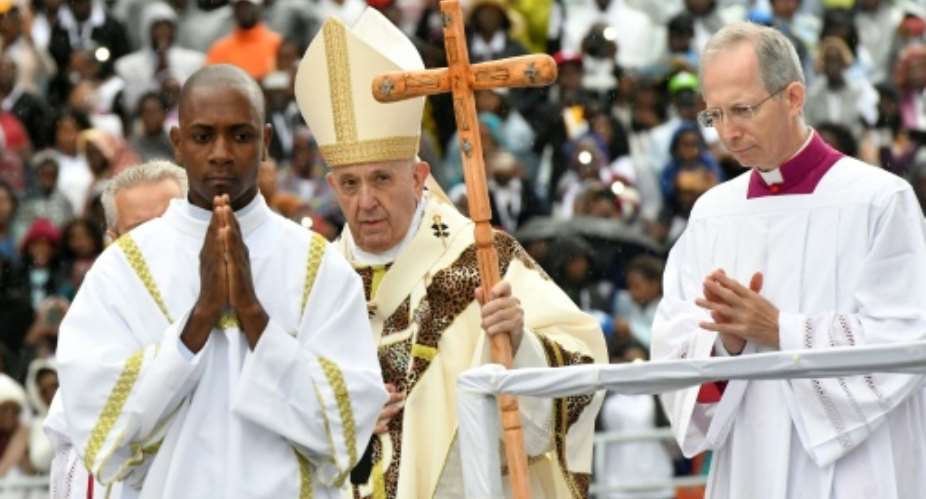Pope Francis on Friday told tens of thousands of faithful at a packed stadium not to resort to "vengeance" as he wound up a visit to Mozambique, ravaged by a 16-year civil war and now the target of jihadist attacks.
His maiden visit to the poor former Portuguese colony came a month after the government and the former rebel group Renamo, now the main opposition party, signed a historic peace treaty.
Brutal jihadist attacks in northern Mozambique have claimed more than 300 lives over two years and forced thousands from their homes.
"We cannot think of the future and build a nation" with violence, the pope said in a homily to a crowd of about 60,000 at the Zimpeto stadium in the Mozambican capital Maputo.
Speaking in Portuguese, he asked them not to follow the old law of retaliation "an eye for eye, a tooth for a tooth.
 The stadium was jampacked and many had travelled hundreds of miles to see the pontiff. By GIANLUIGI GUERCIA (AFP)
The stadium was jampacked and many had travelled hundreds of miles to see the pontiff. By GIANLUIGI GUERCIA (AFP)
"No family, no group of neighbours or ethnic group and even less no country has a future if the motor that unites them... is composed of vengeance and hatred," he said.
Denouncing reprisals cloaked under the guise of legality, the pope warned that violence was "an endless spiral without end with a very high cost.
"You have the right to peace!" he said.
Mozambique is a mainly Christian country and 28 percent of the population is Catholic.
Earlier Friday, the pope visited an AIDS care centre on the outskirts of Maputo, hailing the carers for responding to their "silent cry" for help in a country ravaged by the disease.
 The Argentinian pope addressed the crowd in Portuguese. By Tiziana FABI (AFP)
The Argentinian pope addressed the crowd in Portuguese. By Tiziana FABI (AFP)
According to UNAIDS, 2.2 million Mozambicans -- 60 percent of them women -- were HIV positive in 2018 in the southern African nation of 27 million people.
There were 150,000 new infections last year and 54,000 AIDS-related deaths.
'Restoring dignity'
Francis hailed the "compassion" of the health workers for responding to "this silent cry, almost inaudible, of innumerable women and all the people living in shame, marginalised and judged by everybody.
Francis thanked workers at the AIDS centre for "restoring the dignity" of women and children suffering from HIV and AIDS and for "hearing their cries and intervening personally."
 He also visited a hospital which hosts a programme for HIV-positive people and AIDS patients. By Tiziana FABI (AFP)
He also visited a hospital which hosts a programme for HIV-positive people and AIDS patients. By Tiziana FABI (AFP)
He did not however touch on the delicate subject of prevention -- an issue riddled with minefields given the Catholic Church's stand on contraception -- especially in a largely conservative and traditional continent.
Francis is the first pope to visit Mozambique since John Paul II in 1988 and is on a three-nation tour that includes Madagascar and Mauritius.
On Thursday, the pontiff visited a brand new hospital in Zimpeto, a poor outlying district of the capital, where 23 percent of adult residents have been hit by HIV.
'Dream'
The complex, inaugurated last year, comprises a state-of-the-art laboratory and hosts a programme for HIV-positive and AIDS patients, especially pregnant women.
This programme, named "Dream", was launched in 2002 by the Italian lay Catholic association Sant'Egidio which is very close to the Vatican and is dedicated to social service.
It runs 13 health centres in the country. The "Dream" project is spread across 11 African countries.
Mozambique and Madagascar are among the world's poorest countries and Francis' decision to visit is seen by commentators as an act of solidarity from a cleric who was a frequent presence in the shantytowns of Argentina and is now called the "pope of the poor".





 Akufo-Addo’s govt is the ‘biggest political scam’ in Ghana’s history – Mahama ja...
Akufo-Addo’s govt is the ‘biggest political scam’ in Ghana’s history – Mahama ja...
 Performance Tracker is not evidence-based — Mahama
Performance Tracker is not evidence-based — Mahama
 Four arrested for allegedly stealing EC laptops caged
Four arrested for allegedly stealing EC laptops caged
 $360 million IMF bailout not enough for Ghana – UGBS Professor
$360 million IMF bailout not enough for Ghana – UGBS Professor
 Shrinking Penis Allegations: Victim referred to trauma hospital due to severity ...
Shrinking Penis Allegations: Victim referred to trauma hospital due to severity ...
 Adu Boahen Murder: Case adjourned to May 9
Adu Boahen Murder: Case adjourned to May 9
 ‘I've health issues so I want to leave quietly and endure my pain’ — Joe Wise ex...
‘I've health issues so I want to leave quietly and endure my pain’ — Joe Wise ex...
 Let’s help seek second independence for Ghana before NPP sells the country – Law...
Let’s help seek second independence for Ghana before NPP sells the country – Law...
 New Force aims to redeem Ghana and West Africa — Nana Kwame Bediako
New Force aims to redeem Ghana and West Africa — Nana Kwame Bediako
 ‘I didn't say I would buy Ghana if voted against; I said I’ll buy it back from f...
‘I didn't say I would buy Ghana if voted against; I said I’ll buy it back from f...
